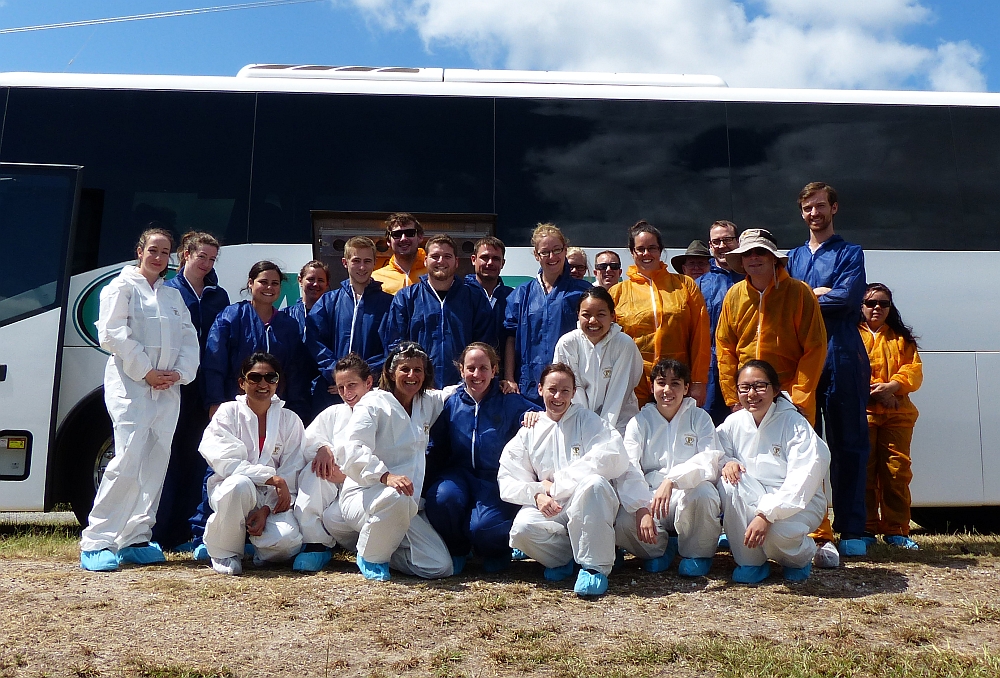Twenty six postgraduate students and interns supported by the Poultry CRC came together with CRC staff and Program Managers in Brisbane on the 15th March for the CRC’s annual PoultryGrad workshop. This year’s program included a one-day field trip to nearby Mount Cotton to visit the Darwalla Hatchery, a broiler grower farm and the Golden Cockerel processing plant. The second day was committed to sessions on advanced scientific writing, delivered by Dr Camilla Myers from CSIRO Publishing.
By taking our students and interns out of their regular work/study environments, they experience first-hand the real-world processes in industry and develop skills, knowledge and networks that will endure. The wonderful (and for many researchers, hard-to-come-by) opportunities to access the types of facilities we saw on the field trip was of great benefit to students/interns. This fact was not lost on them, with feedback including:
- The fieldtrip this year was unforgettable. I have been to a couple of previous PoultryGrads, but the tour this year was particularly memorable because we were able to follow the chickens from hatch through to processing in a single day. I don’t think there would be many people that have had that particular experience; which I think was priceless for people wanting to work in the poultry industry. It really emphasised the entire process and how little things can make a big difference to any processes downstream. I will never forget the visit to the Golden Cockerel processing plant. I have always wanted to visit one because it is the penultimate part of the entire meat chicken process (the ultimate being consumption!), but there always seemed to be secrecy surrounding it given the fact that it deals with euthanising innumerable numbers of chickens. The scale, cleanliness, precision and efficiency of the processing was amazing, and their emphasis on the welfare of the chickens is to be admired.
- I have had limited exposure to hatchery and farm stages of production; however this was my first opportunity to see a processing plant. I had apprehensions as to how I would feel about this, but after being led through the plant and gaining an understanding of the process, any apprehensions I had were eased. I feel much more comfortable with my new knowledge as to how my chicken ends up on my plate! The company’s commitment to animal welfare at every stage of production was very evident in the facilities themselves, but also reflected very strongly in the individual staff members we met. They all did a fantastic job in looking after us and answering our questions. The opportunities to visit such facilities are rare, so Golden Cockerel’s willingness to allow us access was greatly appreciated and very insightful. Thank-you!
The “Essentials of Writing Scientific Papers and Reports” workshops delivered by Dr Camilla Myers the following day were also well received by all. Students worked in pairs and groups, being strategically seated by Camilla before the workshop began. Material was chucked into logical portions and interspersed with exercises. By breaking the sessions into smaller pieces, student could practice what they had learned immediately following delivery. This helped keep the day flowing smoothly and kept the tempo upbeat.
Following the writing workshop, a number of students remarked that they would be returning home to re-work something they had already written, incorporating the techniques they had learned.
“The workshop was informative and surpassed my expectation by providing some information that I am sure will benefit my writing style, specifically on perfecting paragraph and sentence structure” commented one. “I have been struggling to write scientifically sounding sentences. The tips Camilla gave have really helped” said another.
Our postgraduate students and interns are a diverse bunch. We had students from Adelaide University, Central Queensland University, Deakin University, The University of Melbourne, Monash University, the University of New England, The University of New South Wales, University of Queensland, The University of Sydney and The University of Western Australia, along with interns from Australian Egg Corporation Limited, Bioproperties and Zootechny.
A great strength of PoultryGrad is the network these students develop with their peers through irreplaceable face-to-face interaction, establishing life-long working (and personal) relationships. The ongoing success of our intern program coupled with the high retention rate of our graduates is ensuring that the poultry industry in Australia will have a wealth of exemplary talent to draw upon into the future.








